Molo - Hello in Xhosa
-
Molo is a common greeting in Xhosa. We present to you some interesting information about the language and the people who speak the language.
In case you are one of them who speak Xhosa and wish to report inconsistencies, please reply to this topic.
Among the four major ethnic divisions in South Africa, Southern Nguni is considered to be the Xhosa-speaking people. Xhosa is one of the recognizable Bantu languages. It is mostly spoken in South Africa but it is also one of the official languages in Zimbabwe.
Here are 13 spectacular things about Xhosa and its speakers,The 18 percent of South Africans who speak Xhosa amounts to approximately 7.6 million people. While many don’t consider it their mother tongue, it is still a very common language throughout the country.
(Source: https://afktravel.com/)According to one oral tradition, the first person on Earth was a great leader called Xhosa. Another tradition stresses the essential unity of the Xhosa-speaking people by proclaiming that all the Xhosa subgroups are descendants of one ancestor, Tshawe.
(Source: https://www.sahistory.org.za/)The confirmed dialect groups of Xhosa are Gcaleka, Thembu, Mpondo, Bhaca, Xhosa, Ngqika, Mpondomise, Bomvana, and Mfengu.
(Source: https://moguldom.com/)Nkosi Sikelil’ iAfrika, a Xhosa anthem, was the anthem of several different countries including Tanzania, Zambia, and formerly of Zimbabwe and Namibia.
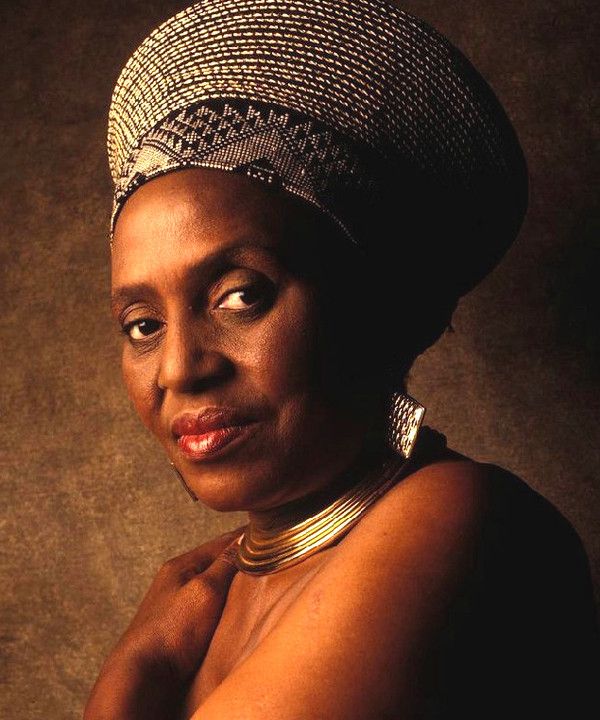
(Image Courtesy: https://www.discogs.com/)
Grammy Award-winning South African singer and civil rights activist Miriam Makeba helped introduce Xhosa to an international audience with her 1957 hit single, “Pata Pata.” It was one of the first mainstream moments for Xhosa.
(Source: https://afktravel.com/)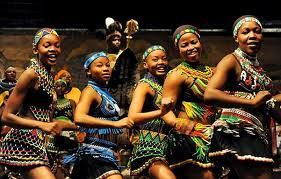
(Image Courtesy: Pinterest)
Storytelling plays a big part in the culture, and this unique ethnic group expresses its stories through music and dance. Xhosa dance is something to astonish, especially the dance form called Umtyityimbo.
Traditionally the Xhosa women wear white dresses that are decorated with black bias binding at the hem and neck, and a headdress made up of two or three different materials of various colors. The colors of the headdresses represent the different areas they come from. On the other hand, married women’s traditional outfit called Isikhakha, which is long aprons over the dresses, decorated with black bias binding and the entire is thing is topped with a cloak made from the same material. They also carry a sling bag called Inxili as an accessory. #
Talking about accessories, Jewellery is a must for Xhosa women. Traditional Xhosa jewellery is consisting of earrings, necklaces, and traditional collars are made from multi-colored beads which compliment the outfits perfectly.
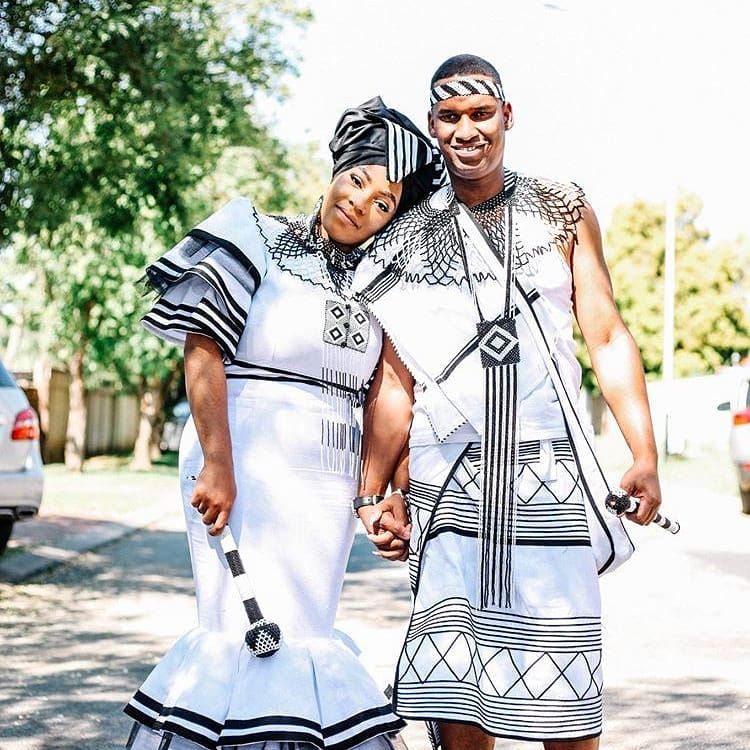
(Image Courtesy: https://www.bontlebride.com/)
Xhosa men wear wraparound skirts that run down from the waist to the feet. They throw a long scarf over one shoulder, which also serves as a cloak when it gets cold. They wear headdresses made from beads or cloth, depending on the customs of their tribes. #
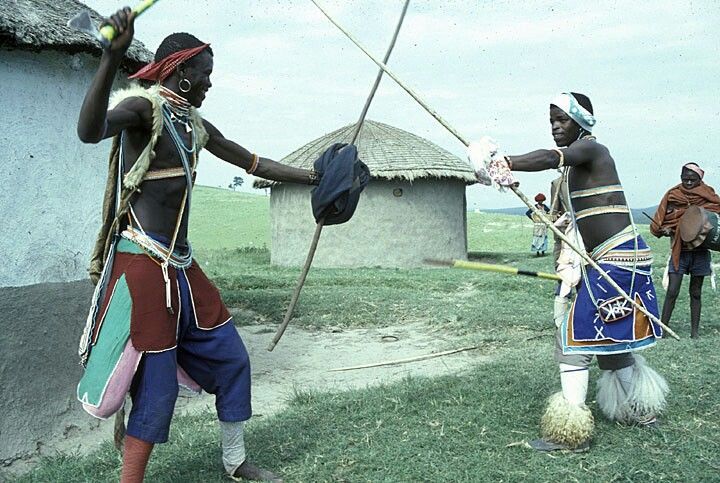
(Image Courtesy: Pinterest)
Stickfighting is an art that Xhosas learn from an early age. Most of the sticks that Xhosa men carry were given to them at their circumcision ceremony.#
Face painting, or Umchokozo, plays a significant role in Xhosa culture, and women decorate their faces with white or yellow ochre and use dots to make patterns on their faces. The decorations are sometimes painted over their eyebrows, the bridge of their noses, and cheeks. #
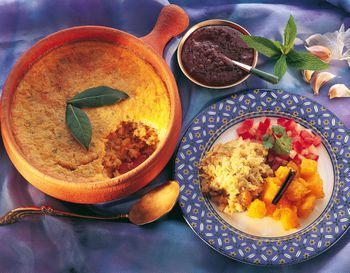
(Image Courtesy: https://shweshwe1.com/)
The staple food of the Xhosa people is Umngqusho made from cracked maize and beans. Maize meal ‘pap’ is also very popular. There are many different kinds of vegetable dishes that feature alongside the staples and various meat dishes are also often prepared.
(Source: https://www.semesteratsea.org/)At Gugulethu Township, students will meet local 'Mamas’ – women who will teach people about traditional Xhosa cuisine that include mentioning the importance of various ingredients in Xhosa cuisine and the cultural significance of certain foods. So, if you want to learn their cuisine, you know where to go.
Hope you like it, if you know any other fascinating facts about Xhosa, let us all know!
# - Source: https://www.southafrica.net/
-
This post is deleted!
-
Molo is a common greeting in Xhosa. We present to you some interesting information about the language and the people who speak the language.
In case you are one of them who speak Xhosa and wish to report inconsistencies, please reply to this topic.
Among the four major ethnic divisions in South Africa, Southern Nguni is considered to be the Xhosa-speaking people. Xhosa is one of the recognizable Bantu languages. It is mostly spoken in South Africa but it is also one of the official languages in Zimbabwe.
Here are 13 spectacular things about Xhosa and its speakers,The 18 percent of South Africans who speak Xhosa amounts to approximately 7.6 million people. While many don’t consider it their mother tongue, it is still a very common language throughout the country.
(Source: https://afktravel.com/)According to one oral tradition, the first person on Earth was a great leader called Xhosa. Another tradition stresses the essential unity of the Xhosa-speaking people by proclaiming that all the Xhosa subgroups are descendants of one ancestor, Tshawe.
(Source: https://www.sahistory.org.za/)The confirmed dialect groups of Xhosa are Gcaleka, Thembu, Mpondo, Bhaca, Xhosa, Ngqika, Mpondomise, Bomvana, and Mfengu.
(Source: https://moguldom.com/)Nkosi Sikelil’ iAfrika, a Xhosa anthem, was the anthem of several different countries including Tanzania, Zambia, and formerly of Zimbabwe and Namibia.

(Image Courtesy: https://www.discogs.com/)
Grammy Award-winning South African singer and civil rights activist Miriam Makeba helped introduce Xhosa to an international audience with her 1957 hit single, “Pata Pata.” It was one of the first mainstream moments for Xhosa.
(Source: https://afktravel.com/)
(Image Courtesy: Pinterest)
Storytelling plays a big part in the culture, and this unique ethnic group expresses its stories through music and dance. Xhosa dance is something to astonish, especially the dance form called Umtyityimbo.
Traditionally the Xhosa women wear white dresses that are decorated with black bias binding at the hem and neck, and a headdress made up of two or three different materials of various colors. The colors of the headdresses represent the different areas they come from. On the other hand, married women’s traditional outfit called Isikhakha, which is long aprons over the dresses, decorated with black bias binding and the entire is thing is topped with a cloak made from the same material. They also carry a sling bag called Inxili as an accessory. #
Talking about accessories, Jewellery is a must for Xhosa women. Traditional Xhosa jewellery is consisting of earrings, necklaces, and traditional collars are made from multi-colored beads which compliment the outfits perfectly.

(Image Courtesy: https://www.bontlebride.com/)
Xhosa men wear wraparound skirts that run down from the waist to the feet. They throw a long scarf over one shoulder, which also serves as a cloak when it gets cold. They wear headdresses made from beads or cloth, depending on the customs of their tribes. #

(Image Courtesy: Pinterest)
Stickfighting is an art that Xhosas learn from an early age. Most of the sticks that Xhosa men carry were given to them at their circumcision ceremony.#
Face painting, or Umchokozo, plays a significant role in Xhosa culture, and women decorate their faces with white or yellow ochre and use dots to make patterns on their faces. The decorations are sometimes painted over their eyebrows, the bridge of their noses, and cheeks. #

(Image Courtesy: https://shweshwe1.com/)
The staple food of the Xhosa people is Umngqusho made from cracked maize and beans. Maize meal ‘pap’ is also very popular. There are many different kinds of vegetable dishes that feature alongside the staples and various meat dishes are also often prepared.
(Source: https://www.semesteratsea.org/)At Gugulethu Township, students will meet local 'Mamas’ – women who will teach people about traditional Xhosa cuisine that include mentioning the importance of various ingredients in Xhosa cuisine and the cultural significance of certain foods. So, if you want to learn their cuisine, you know where to go.
Hope you like it, if you know any other fascinating facts about Xhosa, let us all know!
# - Source: https://www.southafrica.net/
@agentcarter I love African arts, especially how they portray their tradition... amazing piece of information.

